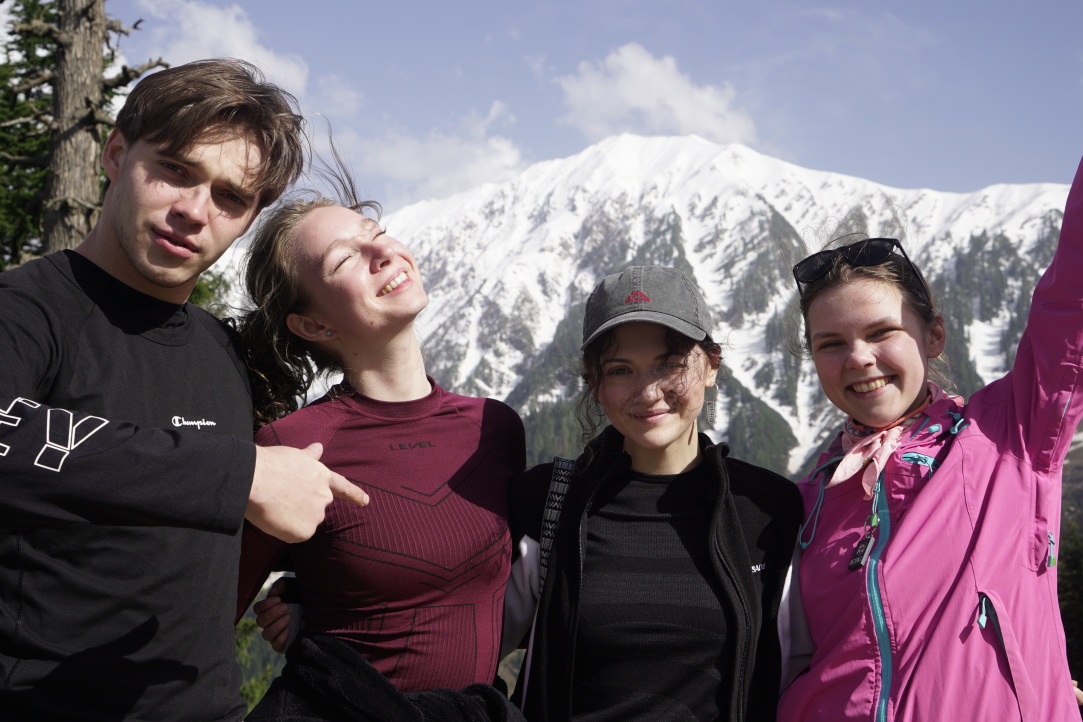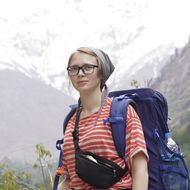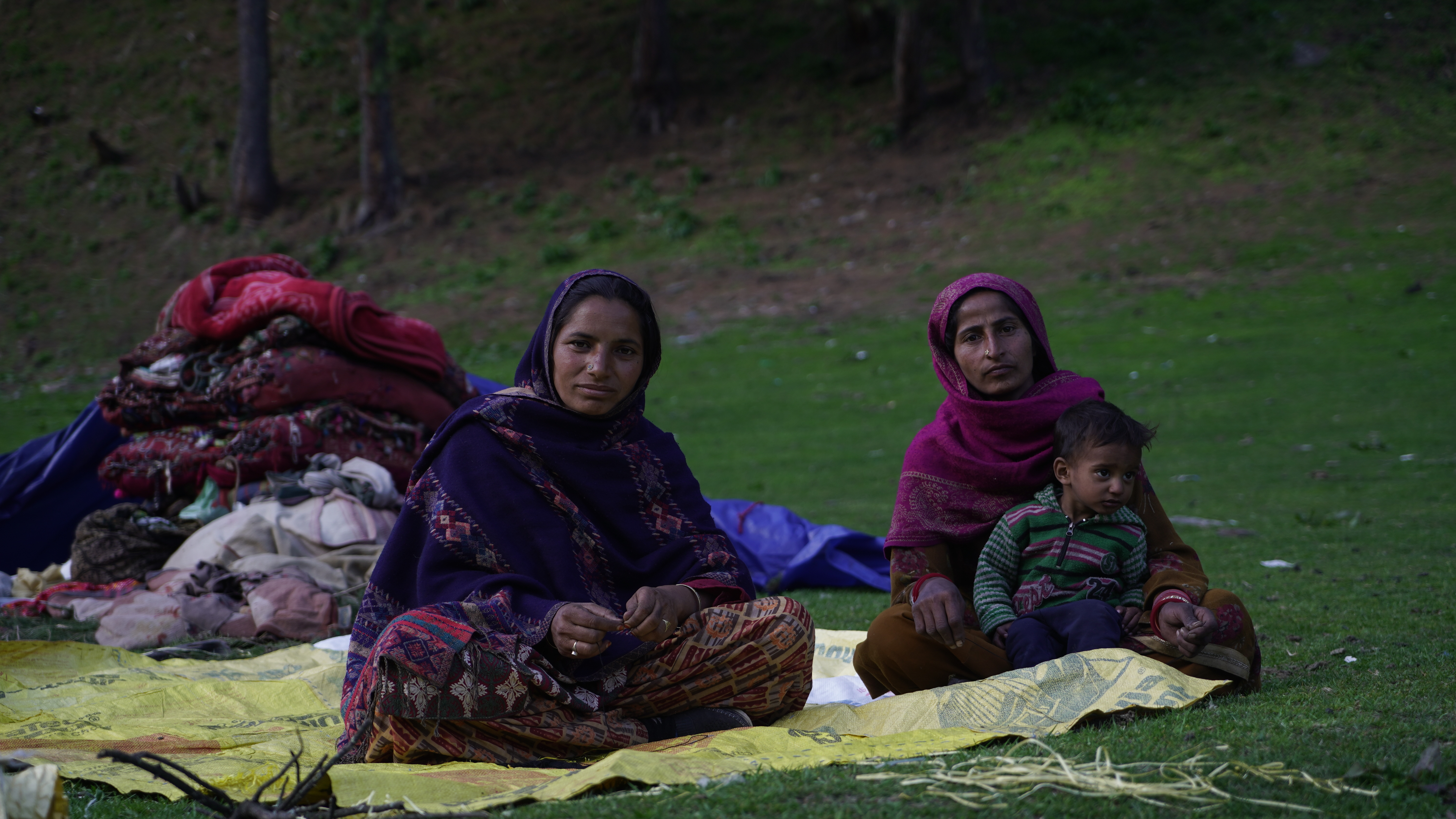Students of HSE University-St Petersburg Explore Social Aspects of Climate Change during the Expedition in the Himalayas
Six HSE students have returned from the expedition to the Himalayas organised by the St Petersburg School of Social Sciences and the University of Delhi. Together with colleagues from the Indian university, they studied local mountain communities of the western part of the Himalayas. The intermediate result of this trip was three hypotheses about the sustainable development of the region. The international project was the first stage of joint climate change research planned for five years.

The trip to the Himalayas was organised by the St Petersburg School of Social Sciences in cooperation with the PGDAV College at the University of Delhi to which the Institute of Mountain Environment and the campus of the University of Jammu in Bhaderwah joined later. The expedition which lasted for 12 days covered the western part of the Himalayas in the states of Himachal Pradesh, Jammu and Kashmir. Over the trip, the participants crossed a 531-kilometre route and conquered several mountain peaks higher than 2000 metres. This allowed students to explore the traditional lifestyle of local tribes of Bakarwal and Ladakhi which live in remote areas of the Himalayas as well as village residents of Kansar, Dandi, Machail and others. Earlier, they rarely got caught in the spotlight of researchers, especially from the perspective of social and humanitarian sciences.

Alexander Sorokin
Dean of the School of Social Sciences
At altitudes above 2000 metres, climate changes manifest themselves most starkly which makes these territories and the local citizens living there especially vulnerable to ecological and climate risks. We strived to understand how the locals integrate into their lives and overcome environmental risks but later, the research focus expanded. Communicating with the informants, we realised that people were concerned with the topic of tourism and the development of the associated infrastructure. The economic factor has come up every now and then in conversations with the representatives of different tribes even when we didn't ask any direct questions. So, our global goal was to study how local communities, natural ecosystems and economic projects like tourism development mutually influence each other. Simply put, how ecological, climate and socio-climate sustainability correlate in the perception of local residents, researchers and governmental officials.
It is useful to study high-mountainous areas not only as models for other mountain ecosystems. Such researches help to assess how climate, ecological and economic changes influence the population. For now, there is not so much research on this topic as they require a broader evidence base. In the Himalayas, we managed to collect the first data to create it.
Sustainable development covers various aspects of social life: economic growth, social responsibility and care for the environment. The students managed to cover them comprehensively thanks to the multidisciplinary team which gathered the students of six bachelor's and master's programmes:
— 'Public Policy and Analytics',
— 'Sociology and Social Informatics',
— 'Law',

Pavel Bazarov
2nd-year student of the Master's programme 'Global and Regional History'
At first, we planned to study how traditional knowledge can be implemented to develop programmes of sustainable development in the Himalayas. But during the expedition, we complemented the focus: we paid more attention to how local communities adapted to climate change and the modernisation of the region. For instance, how nomads preserve their traditional lifestyle despite climate, social and cultural changes.
I as an anthropologist was especially interested in conducting interviews and observing the lifestyle of citizens of remote mountain villages and representatives of the nomad people of Bakarwal. The first, for example, still uses bulls to till the fields and radically reject fertilizers. The second travels hundreds of kilometres not only without modern navigation systems or smartphones but also without maps. They follow the routes they have known since childhood.
In their work, the researchers combine anthropological and sociological methods. They held more than 20 in-depth interviews with local citizens, government representatives and businesses. Besides, the exhibition participants added the methods of social geography: did the territory mapping and measured the heights where the local communities settled.
At all the stages of the expedition, the students received support from researchers from the University of Delhi and later colleagues from the campus of the University of Jammu in Bhaderwah and the Institute of Mountain Environment. The project gathered ecologists, zoologists, botanists, and experts in economics and management. They provided the students with the necessary research background: explained how flora and fauna change in the region together with agriculture and nomads' life. Together with 50 representatives of the local police, border guards, tourism department and local authorities, they also played the role of guides: they ensured the safety of the expeditionary group, planned the routes, picked experts and helped to establish contacts for the interviews.

Ksenia Pugina
1st-year student of the Master's programme 'International Business in the Asia-Pacific Region'
During the exhibition, I managed to understand the depth of Indian culture. Every move of an Indian person has extensive cultural and religious roots. One can study this nation endlessly and always find new aspects. The people are ready and eager to engage. In the expedition, we became a part of every family we talked to—this is the general level of Indian hospitality.
This trip has become an irreplaceable experience for me. My research interest is directly connected with India, so it was twice as nice to become one of the researchers. Also, I want to highlight that the work with such highly qualified specialists in the sphere of field research has become an important step for my professional growth. There are still lots of contacts and ideas for the next work in this sphere left. In just a month, I will go for an internship in the north of India where I will develop related research. The idea of undertaking an internship appeared even before the expedition but certainly, the work with the Indian partners laid a foundation for a deeper cooperation.
Our research group's work resulted in three hypotheses about the sustainable development of the Himalayas which would become the basis for joint scientific papers. The first hypothesis suggests that the representatives of the local communities, including authorities and businesses, pay more and more attention to the problem of air pollution, while water quality degradation becomes a less significant issue for them. 'We arrived at this conclusion together with Professor Pardeep Singh from the PGDAV College at Delhi University after talking to the representatives of different tribes in the Indian Himalayas. We observed a similar opinion of the local and indigenous communities during the expeditions in the mountainous region of Altai in 2021-2023. The questions of why we notice such changes in the perception of different peoples opens new opportunities for joint intercountry research', says Alexander Sorokin, Dean of the School of Social Sciences.
Pardeep Singh
Associate Professor of the PGDAV College at Delhi University
During the expedition, it was interesting to find a great variety of opinions on further development of the region. For instance, some local communities strive for 'development' and look at it from an economic point of view. At the same time, other local citizens have ambiguous attitudes towards the idea combining positive and negative aspects.
The cooperation with HSE University rooted in joint research and educational interests was open, mutually interesting and full of understanding. This expedition formed a strong research team which, I am sure, will be beneficial for India and Russia as well as other countries. I hope that the trip to the Himalayas has become a starting point for creating new interesting projects and enhancing international cooperation aimed at preparing our students for research and academic development.
Attitudes of local communities to tourism differ greatly—this is what the second hypothesis is about. The researchers suggest that in most cases, the representatives of authorities and businesses are interested in attracting tourists. However, among local citizens, the opinions vary: for many of them, the growth of tourism is related to the destruction of their traditional lifestyle, so they see this phenomenon negatively.

Agatha Kurnos
4th-year student of the Bachelor's programme 'Public Policy and Analytics'
As a student of 'Public Policy and Analytics', it was especially interesting to me that the lives of local communities of the Himalayas depended on government decisions. Citizens of the distant villages in the Himalayas have almost no concept of earnings, taxes and even more politics. It is family, religion and nature which predetermine the quality of people's life for them, while modern society usually gives this role to the power from above.
Apart from developing skills in conducting field research and increasing cultural awareness, my participation in the expedition helped to build strong partner and friendship relations with colleagues from our university as well as Indian ones. Communication with the citizens of the Indian Himalayas and the experience of living with them moved me deeply and turned over my life values. This trip has become the most valuable experience for me throughout my studies, and I would definitely want to participate in similar research work further!
The third hypothesis corrected the research methodology. At first, the expedition participants planned to study how local communities adapted to ecological and climate changes. However, talking to informants, the researchers remarked: the locals do not perceive these changes as shocking but remain resistant to them. It motivated students to analyse how local communities manage to maintain the basics of their lifestyle.
Another result of the expedition was a short film created by Dmitry Omelchenko, a visiting lecturer at the Department of Sociology. This film captures the first impressions of the HSE team from the trip to India and the observations which they managed to make in the Himalayas.
Now, the researchers systematise data and prepare transcripts. In the future, they plan to develop cooperation with the University of Delhi and explore other territories of the Himalayas. It is planned that the colleagues from India will also set out on an expedition in the Russian mountain systems. As a result, the researchers are to collect a database which will become a source of information about how local communities adapt to ecological and climate changes in various mountain ecosystems.
Among other things, it is planned to:
— make a joint application for external grants and participation in research projects;
— organise events for HSE University-St Petersburg students, including the ones featuring representatives of government and business of the Indian Himalayas;
— make a documentary based on the collected visual materials.
The School of Social Sciences also conducts research in the spheres of nature protection, environmental behaviour and sustainable development within the mirror laboratory created in February 2024 together with another Indian university—Indian Institute of Management Indore (IIMI). The continuation of the international cooperation of IIMI and HSE University-St Petersburg was the signing of a partnership agreement. It was held during the International Partners' Days which took place at HSE University-St Petersburg in May. The event hosted delegations from 23 international universities.


